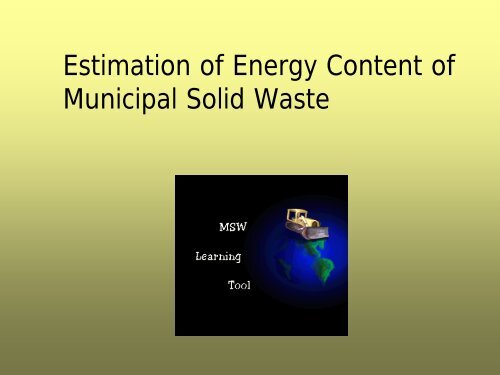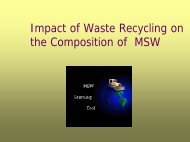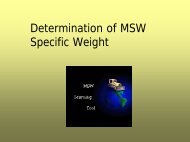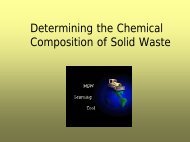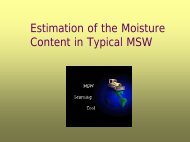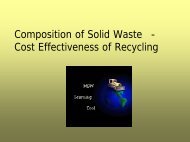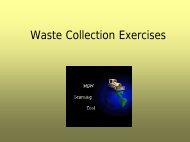Estimation of Energy Content of Municipal Solid Waste
Estimation of Energy Content of Municipal Solid Waste
Estimation of Energy Content of Municipal Solid Waste
You also want an ePaper? Increase the reach of your titles
YUMPU automatically turns print PDFs into web optimized ePapers that Google loves.
<strong>Estimation</strong> <strong>of</strong> <strong>Energy</strong> <strong>Content</strong> <strong>of</strong><br />
<strong>Municipal</strong> <strong>Solid</strong> <strong>Waste</strong>
Problem Statement<br />
Determine the <strong>Energy</strong> Value <strong>of</strong> a Typical<br />
<strong>Municipal</strong> <strong>Solid</strong> <strong>Waste</strong> With an Average<br />
Composition Shown in Table 1.<br />
It is recommended that you use an<br />
electronic spreadsheet when you do this<br />
problem.
Table 1. <strong>Waste</strong> Composition<br />
Component Wet Weight, lb Percent MC<br />
Food <strong>Waste</strong> 8 70<br />
Paper 28 6.1<br />
Cardboard 8 5<br />
Plastics 9 4.4<br />
Textiles 1 10<br />
Rubber 0.8 0<br />
Leather 0.8 12.5<br />
Garden trimmings 22 60<br />
Wood 3 60<br />
Glass 8 2.5<br />
Metals 11.4 1.8
Step 1:<br />
�Determine energy content using data in<br />
Table 2
Table 2. Average Heat Values<br />
Component Heat Value, Btu/lb Dry Weight<br />
Food <strong>Waste</strong> 2000<br />
Paper 7200<br />
Cardboard 7000<br />
Plastics 14000<br />
Texttiles 7500<br />
Rubber 10000<br />
Leather 7500<br />
Garden trimmings 2800<br />
Wood 8000<br />
Glass 60<br />
Metals 300
Step 3: Determine Dry<br />
Weight <strong>of</strong> <strong>Waste</strong> Components<br />
�Since Table 2 is based on dry weight,<br />
from typical moisture contents, adjust<br />
for moisture content.
Table 3. Dry Weight <strong>of</strong> MSW<br />
Component Wet Weight, lb Dry Weight, lb<br />
Food <strong>Waste</strong> 8 2.4<br />
Paper 28 26.3<br />
Cardboard 8 7.6<br />
Plastics 9 8.6<br />
Textiles 1 0.9<br />
Rubber 0.8 0.8<br />
Leather 0.8 0.7<br />
Garden trimmings 22 8.8<br />
Wood 3 1.2<br />
Glass 8 7.8<br />
Metals 11.4 11.2
Step 4: Calculate the <strong>Energy</strong><br />
<strong>Content</strong> <strong>of</strong> MSW<br />
Total <strong>Energy</strong> = (<strong>Solid</strong> waste, lb) *<br />
(<strong>Energy</strong> <strong>Content</strong>, Btu/lb)<br />
Table 4 provides the total energy content<br />
in Btu.
Table 4. Total Btu content<br />
Component Wet Weight, lb Dry Weight, lb Btu<br />
Food <strong>Waste</strong> 8 2.4 4800<br />
Paper 28 26.3<br />
Cardboard 8 7.6<br />
Plastics 9 8.6<br />
Textiles 1 0.9<br />
Rubber 0.8 0.8<br />
Leather 0.8 0.7<br />
Garden trimmings 22 8.8<br />
Wood 3 1.2<br />
Glass 8 7.8<br />
Metals 11.4 11.2<br />
Total
Table 4. Total Btu content<br />
Component Wet Weight, lb Dry Weight, lb Btu<br />
Food <strong>Waste</strong> 8 2.4 4800<br />
Paper 28 26.3 189360<br />
Cardboard 8 7.6 53200<br />
Plastics 9 8.6 120400<br />
Textiles 1 0.9 6750<br />
Rubber 0.8 0.8 8000<br />
Leather 0.8 0.7 5250<br />
Garden trimmings 22 8.8 24640<br />
Wood 3 1.2 9600<br />
Glass 8 7.8 468<br />
Metals 11.4 11.2 3360<br />
Total 425828
Step 5: Determine the<br />
Specific Btu <strong>Content</strong> (Btu/lb)<br />
Specific <strong>Energy</strong> content =<br />
total energy, Btu/ total waste,lb<br />
From Table 4, Total energy = 425800 Btu<br />
<strong>Solid</strong> <strong>Waste</strong> = 100 lb<br />
Specific <strong>Energy</strong> <strong>Content</strong> = 425800/100 Btu/lb<br />
= 4258 Btu/lb<br />
~ 4300 Btu/lb
Class Example<br />
Component Wet Weight, lb<br />
Food <strong>Waste</strong> 10<br />
Paper 32<br />
Cardboard 7<br />
Plastics 6<br />
Textiles 2<br />
Rubber 1<br />
Leather 2<br />
Garden Trimmings 18<br />
Wood 5<br />
Glass 7<br />
Metals 10<br />
Repeat the example with<br />
the waste composition<br />
shown.<br />
How does moisture<br />
content impact Btu<br />
content?<br />
What potential conflicts<br />
can you see with<br />
respect to waste to<br />
energy vs recycling?
Return to Home Page<br />
Last updated July 2004 by Dr. Reinhart


